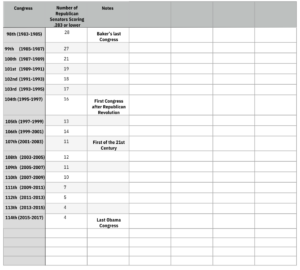When Jesse Helms joined the Senate in 1973, he quickly became the chamber’s arch-conservative agitator, with its second-most conservative voting record. At the time, his willingness to adopt hardball tactics and upend the congeniality of the Senate made him a revolutionary and heralded the coming of the hard-edged “New Right.” In his last Congress, three decades later, he still ranked as the most conservative senator in the chamber.
Today? By a scholarly metric that measures the ideology of members of Congress, Helms’s career voting record would only rank 14th most conservative, right between Tim Scott of South Carolina and Ted Budd of North Carolina — neither of whom is considered particularly revolutionary.
This illustrates something not discussed frequently enough in the media: Republicans have lurched so far to the right over the last few decades that labels like moderate and conservative have become distorted.
The truth is, real moderates are gone. The media uses the label for people whose voting records would have put them far from the center in Congress even as late as the 1980s and 1990s. Conversely, those considered staunch conservatives in the past would earn the scornful moniker of RINO — Republican in Name Only — today and would struggle to survive.
Consider legendary Senate Majority Leader Howard Baker. In his final Congress (1983-1984), Baker was exactly in the center of his caucus: There were 27 more moderate/liberal GOP senators and 27 more conservative ones. Today, however, Baker would rank as the fourth most liberal Republican senator.
The principle works in the other direction historically as well. In 2024, Mitt Romney is perceived as a total heretic who his party has ostracized for his lack of fealty to Donald Trump and his inclination toward compromise and legislating. He has the 4th most liberal voting record among Republican senators. But in the first Congress of the Reagan Revolution (1981-1983), when Republicans had just gained 12 Senate seats and recaptured the chamber for the first time since 1955, Romney’s record would only have made him the 29th most liberal Republican in the chamber.
The same pattern exists in the House. Newt Gingrich incited a revolution of his own in the 1980s and 1990s and spent two decades prodding House Republicans toward confrontation and political warfare. He did much to help create the polarized, dysfunctional politics of today. Nevertheless, his career still illustrates the dramatic rightward shift among the chamber’s Republicans.
In his first Congress, only 39 House Republicans (and one arch-conservative Democrat) were to the right of Gingrich, though they some big names like future Vice Presidents Dan Quayle and Dick Cheney. By the time he left Congress in 1998, he had 125 more conservative Republican colleagues. In the current Congress? One hundred and seventy-eight Republicans (the scores include members like former Speaker Kevin McCarthy, who have left the House) would be to Gingrich’s right and shockingly only 46 would be to his left.
To pick another big name identified with conservatism in the past, Jack Kemp was the man who helped make unyielding fealty to tax cuts GOP orthodoxy. In his first Congress (1971-1973), there were only 60 Republicans to Kemp’s right. By his last Congress, there were 107. And in the current Congress, more than 200 Republicans would be to Kemp’s right, and only 20 would be to his left.
Indeed, what’s most striking is how people who identified with the conservative wing of the GOP in the past would be among the most moderate Republicans in Congress today. Al D’Amato won his Senate seat in 1980 by challenging liberal Republican legend Jacob Javits in a primary in New York. D’Amato upset Javits and went on to win a three-way race against the senator (who ran on the Liberal Party line) and a Democrat. D’Amato ran explicitly as a Reagan conservative. His voting record never quite matched his rhetoric, but in his first Congress, D’Amato was only the 13th most liberal/moderate Republican. Today? He’d be the 2nd most moderate, behind only Maine’s Susan Collins.
Similarly, when Bob Dole first joined the Senate in 1969, he earned a reputation as a snarling conservative hatchet man. This brand was one reason that Gerald Ford chose Dole to replace Nelson Rockefeller as his running mate in 1976 in an effort to fend off a challenge from the right from Ronald Reagan. Dole’s record reflected his reputation. In his first two years in the Senate, only 15 Republicans were to the right of Dole, with 28 to his left. In his last Congress, after the Republican Revolution of 1994, there were 33 Republicans to the right of now-Majority Leader Dole and 21 to the left. Stunningly, in 2024, Dole would be the 5th most liberal Republican.
Even Barry Goldwater — Mr. Conservative — the furthest right Republican when he joined the chamber in 1953 and still the second most conservative when he left for good in 1987, would have 11 colleagues to his right today.
If the individual cases don’t adequately portray a party that has lurched seismically to the right, the overall numbers do.
The chart below shows the drop off in the number of Republican senators at Baker’s score or to its left beginning with his last Congress and going through the end of the Obama years, by which the transformation was basically complete.

Democrats have moved leftward during the same period, but by nowhere near as much as Republicans have moved rightward. Ted Kennedy was the personification of liberalism during his decades in the Senate, even challenging Jimmy Carter in the 1980 presidential primary for being too conservative. In Kennedy’s first term in the Senate (1963-1965), he was the 14th most liberal Democrat in the chamber. In his last term, he was the 3rd most liberal, and today, his record would put him 10th from the left.
Understanding the transformation of the GOP is key to comprehending our politics. Too often, the media will label someone a moderate Republican because they’re somewhat interested in governing or are less right-wing than most of their colleagues. But the stark reality is most of those members would’ve been identified with the right wing of the GOP even after the Reagan Revolution ushered conservatism into the driver’s seat of American politics. It explains why almost all Republicans in the House are willing to do radical things like impeach Homeland Security Secretary Alejandro Mayorkas over policy differences and why the Senate GOP killed conservative border security legislation after deputizing a member of their caucus to negotiate it.
This is not your father’s GOP, and many proud and prominent Republicans from the past would find today’s version of their party unimaginable.







